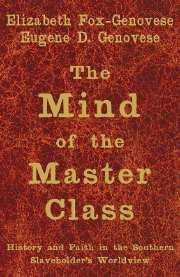Book contents
- Frontmatter
- Contents
- Preface
- List of Abbreviations
- Prologue
- PART ONE CRADLED IN THE STORMS OF REVOLUTION
- PART TWO THE INESCAPABLE PAST
- 4 History as Moral and Political Instruction
- 5 The Slaveholders' Quest for a History of the Common People
- 6 World History and the Politics of Slavery
- 7 History as the Story of Freedom
- PART THREE ANCIENT LEGACIES, MEDIEVAL SENSIBILITY, MODERN MEN
- PART FOUR A CHRISTIAN PEOPLE DEFEND THE FAITH
- PART FIVE AT THE RUBICON
- Epilogue: King Solomon's Dilemma
- Supplementary References
- Index
4 - History as Moral and Political Instruction
Published online by Cambridge University Press: 05 June 2012
- Frontmatter
- Contents
- Preface
- List of Abbreviations
- Prologue
- PART ONE CRADLED IN THE STORMS OF REVOLUTION
- PART TWO THE INESCAPABLE PAST
- 4 History as Moral and Political Instruction
- 5 The Slaveholders' Quest for a History of the Common People
- 6 World History and the Politics of Slavery
- 7 History as the Story of Freedom
- PART THREE ANCIENT LEGACIES, MEDIEVAL SENSIBILITY, MODERN MEN
- PART FOUR A CHRISTIAN PEOPLE DEFEND THE FAITH
- PART FIVE AT THE RUBICON
- Epilogue: King Solomon's Dilemma
- Supplementary References
- Index
Summary
The earthly city, has created for herself such false Gods as she wanted, from any source she chose – even creating them out of men – in order to worship them with sacrifices. The other city, the heavenly City on pilgrimage in this world, does not create false gods. She herself is the creation of the true God, and she herself is to be his true sacrifice. Nevertheless, both cities alike enjoy the good things, or are afflicted with the adversities of this temporal state, but with a different faith, a different expectation, a different love, until they are separated by a final judgment, and each received her own end, of which there is no end.
—AugustineSoutherners needed to know from whence they came and where they were going. Hence, like other Americans, they turned to history as well as religion for moral guidance for nations and for individuals – for illumination of the rise and fall of empires and nations in consequence of incurring the wrath of God. Professor Francis Lieber, a German, who viewed his residence in South Carolina as an exile to nowhere, for once spoke for the Southerners among whom he lived so uncomfortably. In his inaugural address at South Carolina College, Lieber lauded the moral instruction of historical study, especially for “the sons of republicans, who at some future period, [may] have themselves to guide the state.”
- Type
- Chapter
- Information
- The Mind of the Master ClassHistory and Faith in the Southern Slaveholders' Worldview, pp. 125 - 169Publisher: Cambridge University PressPrint publication year: 2005



